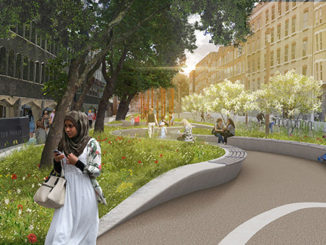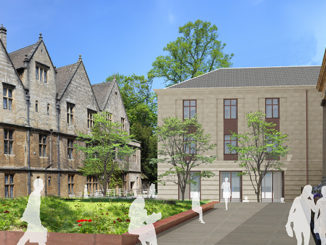One of Bristol’s most iconic streets is set for transformation on 4 July, after a successful campaign for pedestrianisation.

From 4 July, historic King Street will be free from motor vehicles along its entire length, creating a new open space and place to socialise in the heart of the city. The temporary removal of traffic enables far more outside seating for bars and cafés, to give them the chance to recover their losses following the C-19 pandemic. Temporarily pedestrianising the street also provides a large flexible new space outside the Bristol Old Vic theatre for outdoor performances.
LDA Design helped local traders to reimagine the 17th century street as a place for socially distanced eating, drinking and performance. Clare Wilks of LDA Design comments, “Permission for temporary closure was secured within days – this was fast, thoughtful work by Bristol City Council. The move fits with a wider strategy to pedestrianise the old streets of the city centre, making Bristol a safer and healthier place for residents, workers and visitors and making it far easier and more pleasant for pedestrians and cyclists to get around. For King Street, we are using attractive timber cones initially to define the space, and planters and other features will be designed once we can see how the street is being used. Parking for people with disabilities will be provided at the top and bottom of King Street.”
Local traders campaigning for pedestrianisation argued that reopening on 4 July with social distancing measures in place would not be economically feasible if King Street remained trafficked. Small Bar owner Bruce Gray comments, “The police, councillors, the City Centre Business Improvement District and LDA Design all put their weight behind the plan. We are confident that King Street will now attract and safely host enough customers to make the difference between bars and cafés operating at a loss this summer or breaking even.”
The initiative has been led by the newly formed King Street Collective which represents all stakeholders who are reimagining the area. Paula Ratcliffe, Business Liaison Manager with the city centre’s Business Improvement District, comments: “Everyone has worked hard to arrive at this plan and the vision and attention to detail will ensure that the area is a great place to be.”
While the urgency of the plan is driven by helping businesses post the pandemic, the King Street Collective hope that the street will remain pedestrianised on a permanent basis. Spaces along the street can then be clearly defined, using high quality materials which respect its historic character. The short length of King Street which leads to the waterfront has been successfully pedestrianised for some time.
Image and Text | LDA Design



